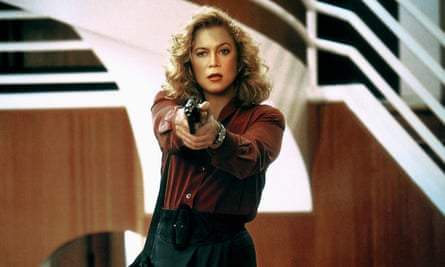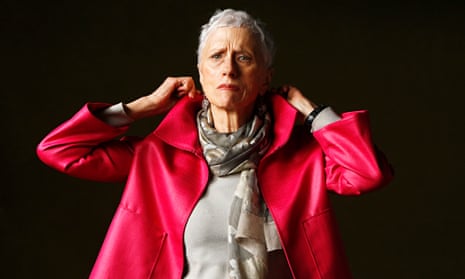In 2007, Sara Paretsky took time out from her day job as a crime writer to publish her memoir. Writing in an Age of Silence is brief but brilliant: a plea for the power of language, in which Paretsky sketches her passage from tyrannised child to acclaimed author, decries the then-incumbent Bush administration’s attacks on freedom of speech, and exhorts her readers to topple “those forces that seek to silence us, to rob us of our voices”. Along the way, she throws in a whistlestop tour of the civic crises of the American century (McCarthyism, civil rights, Roe v Wade) and speaks frankly about the skeletons in her own family closet. The whole thing comes together in an atmospheric jumble of personal testimony and polemic that swings along so engagingly it would be easy to miss the extraordinary confession she slips into the opening chapter. “I call myself a writer,” she says, halfway through a paragraph discussing the difficulties of coming of age in a male-dominated literary landscape. “But I do so without great conviction.”
Let’s look at the evidence. Here is an author who set out to change the face of contemporary crime fiction – and succeeded. In fact, as her memoir makes clear, her literary career was born out of the conviction that it ought to be possible to “create a woman who was a person, not an angel or a monster”. Although she grew up reading mystery novels, Paretsky didn’t come across Raymond Chandler until her early 20s; The Big Sleep marked her first encounter with that staple of noir fiction, the femme fatale; in this case Carmen Sternwood, a woman who not only commits murder, but drives the men around her to do the same through the corruptive force of her sexuality. The year was 1971, and Paretsky was heavily involved in second-wave feminism; so enraged was she by Chandler’s depiction of women that she vowed to “write a crime novel ... that would turn the tables on the dominant views of women in fiction and in society”. With the 1982 publication of Indemnity Only, in which her tough-minded, big-hearted, fiercely self-reliant private investigator VI Warshawski strides on stage, she did just that; five years later, she instigated the social change she had dreamed of by founding Sisters in Crime, an organisation committed to “helping women who write, review, buy or sell crime fiction”. “Without her example,” said Val McDermid, speaking at this year’s Theakston’s Old Peculier crime writing festival, where Paretsky was presented with the Outstanding Contribution to Crime Fiction award, “many of us wouldn’t be where we are today.”
The danger, of course, is that any novel that starts life as a point of principle will wither and die on the page. But there’s nothing of the dry, intellectual exercise in Paretsky’s work: alongside the still-noteworthy presence of a female hero whose gender is not the most significant thing about her, Paretsky’s novels are distinguished by their knotty plotting and vitalised by her almost tactile rendering of Chicago – VI’s home town, and Paretsky’s beloved adopted one. These are living, breathing books, easy to fall for, and she has the sales figures and bulging trophy cabinet to prove it. If she hasn’t earned the right to call herself a writer, who has?
I meet Paretsky on the London leg of the publicity tour for Brush Back, her 17th VI novel. In person delicate and elegant, she’s also the owner of one of the world’s great voices: so rich and languid that I have to remind myself more than once to listen to the words as well as the music. A mention of Harper Lee’s Go Set a Watchman puts us on a conversational path that takes in race (“I don’t know how you survive being black in America: the squeeze is constant”), Obama (“I don’t think he’s a skilful politician – he’s too cerebral – but he’s had a much more successful presidency than the public gloss on it”) and Chicago’s social and political evolution over the last century (she breaks off to sketch a map of the city in my notebook). When discussing the world, particularly the political theatre, she’s supremely confident: clear, knowledgeable, secure in her opinions. But when I ask her why she doubts her own status as an author, her eyes drop.
“I’ve had a lucky career,” she says. “I could have created VI in 1960 and had her just” – she mimes a nosedive. “But I happened to do it as second-wave feminism was cresting and there was a need for this kind of character. And I started out when publishers were willing to let writers grow. My first book sold 3,500 copies; you’d never get a second with that now.” But doesn’t calling herself lucky diminish what she’s achieved? “My external self knows I’ve done well. But ...” she pauses. “In [her memoir on writing] Bird by Bird, Anne Lamott talks about this radio station, K-FKD, that constantly plays all the negative things you think about yourself: you’re clumsy, you’re stupid, you’re fat. Turning off that radio takes so much energy. I start each book convinced I can’t do it.”
The roots of this startling cognitive dissonance are buried all the way back in Kansas, where she was brought up. Her family moved to the city of Lawrence when she was four, so that her microbiologist father could take up a post at the University of Kansas. At the time, the city maintained iniquitous zoning laws “spelling out where blacks and Jews could live”, and as a Jewish family, they soon ran into problems. “We were kept to this rundown, flood-prone area, where lots of the houses still had dirt floors,” Paretsky says. “The realtors told my parents that, because they didn’t look Jewish, they’d show them property elsewhere, but my mother was furious. So they found this big old farmhouse in the country and in 1958, we moved out there.”
At this point, when Paretsky was about 11, her childhood suffered a near-fatal rupture. The world outside her front door offered a version of the American pastoral: “a Laura Ingalls Wilder idyll. We went to a two-room country school; ran around without having to worry; had a badminton net in our yard and played after supper.” Once over the threshold, however, she was plunged into pure American gothic. Moving to the country, Paretsky recalls, “was very hard on my mother. She didn’t work, and it was a couple of years before she even learned to drive. She turned to drinking and everything just deteriorated.”
And how. Paretsky’s father, a brilliant teacher, was a domestic bully; her mother a fiercely bright woman lacking any outlet or fulfilment. Trapped in each other’s company, the pair fought endlessly and bitterly. Their great folly of a house sagged and silted up around them, and the raising of Paretsky’s two younger brothers (she has four in total) fell largely to her. Furthermore, while her parents promoted their sons’ education, any ambition she showed was ridiculed. When she told her father she’d like to be a scientist, “he told me I was too stupid”; her mother, for her part, made it plain that all she could expect from life was marriage and motherhood.
“They were both very insecure. My father felt more threatened by my brothers – I was just caught in the backlash. But my mother was complicated. She’d walked away from a full scholarship to medical school, and gave us a different reason why every time she talked about it: my guess is she was just terrified. But at the same time she was angry about not having a public sphere. So it mattered to her that I failed; that I validated her not operating outside the home.” There were times, she says, when “I would think I must be making it up; what I’m telling my friends she’s saying and doing can’t be right. But when she was dying she apologised to me. It was an external confirmation that what I thought was going on was going on, but it was hard to hear; it showed she’d been quite aware she was doing it. You think, ‘Well, fuck, I could have had an easier life.’”

In thrall to her parents’ neuroses, Paretsky agreed to stay in Kansas to go to university, but headed to Chicago in the summer of 1966 and became swept up in Martin Luther King’s freedom movement. She returned there to study for her PhD and has remained ever since; the city’s politics, geography and peculiar tensions form the heart and backbone of her novels. It was here, too, that she began to entertain the possibility of writing, but even then, her parents’ voices rang in her ears. “It took me eight years, from having the idea for VI, to get the book written,” she says. “I’ve always been slow to the starting gate. I feel like this giant lump that needs a charge of dynamite under me.” Again, there’s that disconnect between objective reality (her output puts most other novelists to shame) and her subjective experience of it. Some of this, she acknowledges, “was a function of growing up the way I did, without any floor of confidence. My husband helped enormously: he’s always had huge confidence in me.”
Paretsky met the physicist Courtenay Wright, her future husband, in 1970. They obviously adore one another, but even here, she puts her success down to luck and timing. He is 23 years older than her and she says “his first wife had been ill for many years. He’d looked after her and the children, and after she died, he had a period of cutting loose. I met him at the moment when he was ready to settle down again.” After the turmoil of her childhood, she “didn’t want children of my own for a long time. There was a period when I regretted it, but nowadays the regrets are intellectual: I feel ... a loneliness going forward. People say to me, ‘You have your books’, but that’s different. I’m delighted that my books have a readership, and people have been influenced by them, but they are not personal, the way children are.”
And yet it’s the personal that has motivated Paretsky throughout her career: her desire to create a woman who refuses to be silenced; whose conviction that her voice deserves to be heard makes up for Paretsky’s corresponding lack of one. “It all comes down, in the end, to the need for speech,” she says. “I’m easily personally silenced, and in the public sphere, speech for women remains a deeply problematic issue.” She takes a contemporary example: “Just look at Gamergate: one woman points out the amount of rape in video games, and 10,000 people threaten to rape her. That’s why VI’s not going away, for me. I feel like there’s a dance or two in the old girl yet.”

Comments (…)
Sign in or create your Guardian account to join the discussion